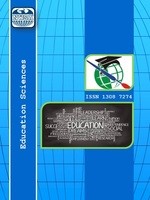ORTAÖĞRETİM ÖĞRENCİLERİNİN PROBLEM ÇÖZMEYE YÖNELİK İNANÇ VE ÖZ-YETERLİLİK ALGILARI İLE RUTİN VE RUTİN OLMAYAN PROBLEMLERDEKİ BAŞARILARI ARASINDAKİ İLİŞKİNİN İNCELENMESİ
Bu çalışmada, öğrencilerin öz-yeterlilik algıları ve problem çözmeye yönelik inançları ile rutin ve rutin olmayan problemlerdeki başarıları arasındaki ilişkinin belirlenmesi amaçlanmıştır. Bu amaç doğrultusunda, farklı okul türlerinde öğrenim gören 63 onuncu sınıf öğrencisine problem çözmeye yönelik inanç ve matematiğe karşı öz-yeterlilik algısı ölçeği ile rutin ve rutin olmayan problemlere yönelik başarı testleri uygulanmıştır. Yapılan çalışmanın sonucunda, öğrencilerin problem çözmeye yönelik inançları ile rutin olmayan problemlerdeki başarıları arasında pozitif yönde anlamlı bir ilişki olduğu görülürken, problem çözmeye yönelik inançları ile rutin problemlerdeki başarıları arasında istatistiksel olarak anlamlı bir ilişki olmadığı görülmüştür. Ayrıca, öğrencilerin matematiğe karşı öz-yeterlilik algıları ile rutin ve rutin olmayan problemlerdeki başarıları arasında da istatistiksel olarak anlamlı bir ilişkiye rastlanmamıştır.
Anahtar Kelimeler:
Rutin Problemler, Rutin Olmayan Problemler, Problem Çözmeye Yönelik İnanç, Matematiğe Karşı Öz-Yeterlilik Algısı
THE RELATIONSHIP BETWEEN SECONDARY STUDENTS' BELIEFS ON MATHEMATYCAL PROBLEM SOLVYNG AND MATHEMATYCAL SELF-EFFICACY PERCEPTION AND THEIR ACHIEVEMENT IN ROUTINE AND NON-ROUNTINE PROBLEMS
The aim of the study is to determine the relationship between the students' beliefs and self-efficacy perception on problem solving and their achievement in routine and non-routine problems. In accordance with this purpose, the achievement tests including routine and non-routine problems were performed to the 63 tenth grade students studying in different schools with the help of self-efficacy perception on mathematics and the beliefs in problem solving. As a result of the study, it has been reached that there is a significant relationship in a positive way between students' beliefs in problem solving and achievement in non-routine problems but there is not a significant relationship between students' beliefs in problem solving and their achievement in routine problems. In addition ,there is not a significant relationship between students' self-efficacy perception on mathematics and their achievement in routine and non routine problems.
Keywords:
ROUTINE PROBLEMS, NON-ROUTINE PROBLEMS MATHEMATICAL PROBLEM SOLVING BELIEFS, SELF-EFFICACY PERCEPTYON ON PROBLEM SOLVING, PROBLEM SOLVING, ,
- Başlangıç: 2009
- Yayıncı: E-Journal of New World Sciences Academy
Sayıdaki Diğer Makaleler
İLKÖĞRETİM OKULU ÖĞRENCİLERİNİN SOSYAL KULÜP ETKİNLİKLERİ KONUSUNDAKİ GÖRÜŞLERİ (BİTLİS İLİ ÖRNEĞİ)
ÖĞRETİM ELEMANLARININ ZAMAN YÖNETİMİNDE BİLGİSAYARI KULLANMA DÜZEYLERİ
VİDEO PAYLAŞIM SİTELERİNİN EĞİTSEL AMAÇLI KULLANIMI
YAPILANDIRMACI COGRAFYA OGRETIMINDE HALK KULTURUNE DAYALI BIR DURUM CALISMASI
21. YÜZYILDA ÖĞRETMEN ADAYLARININ BİLGİ OKURYAZARLIK BECERİLERİNİN DEĞERLENDİRİLMESİ
POSTMODERN BİR DRAMA UYGULAMASI: MEKANİK KAVRAMLARI KULLANILARAK HAZIRLANMIŞ KAVRAM AĞI
Haki PEŞMAN, Mustafa Şahin BÜLBÜL
